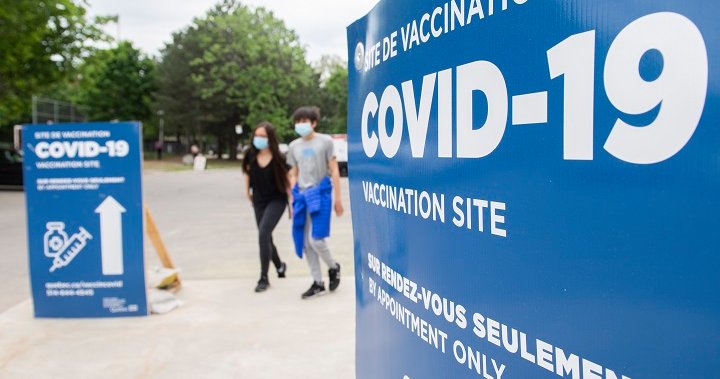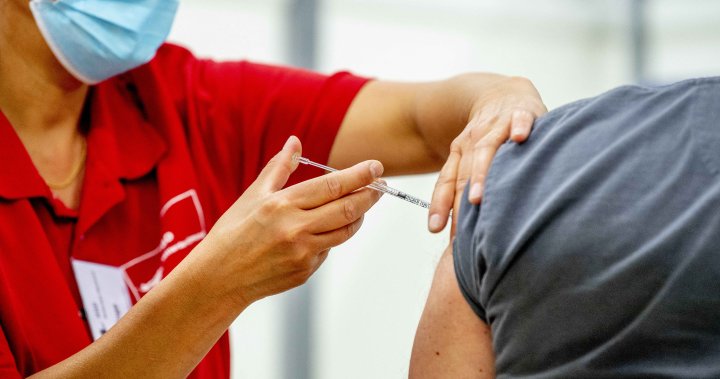The survey results suggest Biden’s prudence is warranted, said Robert Blendon, a professor of health policy and political analysis at the Harvard T.H. Chan School of Public Health, who designed the poll.
“An important takeaway from the poll is that in these [Republican-leaning] areas it is going to be very slow in getting these people to agree to take a vaccine,” he said. “There is a culture in part of the country that is very resistant to having the government tell people how to live their lives.”
Even the president’s suggestion that his administration would go door-to-door to promote the vaccine drew swift rebuke from conservatives, some of whom raised the specter of the federal government keeping a list of unvaccinated Americans that it would soon be targeting. HHS Secretary Xavier Becerra on Thursday sought to reassure Americans that no such database exists after he said his comments about the government’s interest in ensuring people are vaccinated were taken “wildly out of context.”
The deepening divide over vaccine mandates and passports mirrors the gap in vaccination status. Democrats are far more likely to be vaccinated, according to a number of surveys. Each of the 20 states where more than half the population has been fully vaccinated voted for Joe Biden in 2020.
Several Republican governors over the last two months, eager to show they weren’t forcing vaccines on the public, have signed legislation or issued executive orders prohibiting vaccine passports, though roughly one-third of Americans don’t really understand the term, according to the survey.
Republican officials, Blendon said, latched onto a term that appeared in the media before there was a common understanding of what a vaccine passport was.
“Somebody decided this would be a cute name,” he said. “A passport is something most people carry only if they want to go overseas.”
Still, with the government administering fewer than 400,000 doses per day for the first time since late December, pressure is growing on the FDA to grant full approval to Pfizer’s and Moderna’s Covid-19 vaccines, a move that could make it easier for employers and local governments to mandate vaccination.
But most employers seem unwilling to make that move. While some like Walmart, Dollar General, Aldi and Instacart are offering rewards if workers get the shot, few plan to require the vaccine, according to a May survey from Willis Towers Watson.
Blendon suspects businesses, especially small and medium-sized companies looking to hire people in a tight labor market, won’t have much choice given that more than half of employed Americans oppose a workplace mandate. The survey did not look at the effect incentives such as gift cards or stipends would have on employees’ choice, though Blendon speculated that it could help.
There was bipartisan support for vaccinating teachers and health care workers. The survey found that 70 percent of respondents — and 56 percent of Republicans — with school-aged children thought public schools should require teachers be vaccinated. Similarly, 66 percent of respondents — and 59 percent of Republicans — favored health care institutions requiring their employees get the shot.
There was also broad support for requiring proof of vaccination before boarding flights or cruise ships, which Blendon suspected was because the settings require people to be inside and in close proximity to one another. Most Americans opposed requiring vaccination to attend a sporting event or enter a store.
The findings track with other surveys from the spring that found Americans are split over employer and K-12 mandates. It will likely take the emergence of a variant that is even more transmissible and dangerous to change attitudes, especially around children, Blendon said.
“If cases among children emerge and children are hospitalized in much larger numbers, you could see these numbers changing,” he said. “People have to see it, they have to know kids are in the hospital in their neighborhood because they weren’t vaccinated.”
Of those Americans who died last month from the coronavirus, more than 99 percent were not vaccinated, according to federal health officials.
The survey found far more consensus over the question of whether the government should allow importation of less expensive medicines from foreign countries. Nearly 80 percent said it should be legal for Americans to purchase drugs from Canada and more than two-thirds supported importation from the European Union and Great Britain. Buying drugs from Mexico and Japan also received strong support across the political spectrum. Only importation from China gave respondents pause, with 61 percent in opposition.
But Blendon said the key is the overwhelming support for the EU and United Kingdom, which have large manufacturing industries. He speculated the numbers were buoyed by the success of the Covid-19 vaccines like Pfizer and Moderna.
“The idea that we are moving approved, safe vaccines around the world has led a lot of people to say we could probably move pharmaceuticals too,” Blendon said.
The poll surveyed 1,009 adults from June 22-27. The margin of error was plus or minus 3.8 percentage points.





